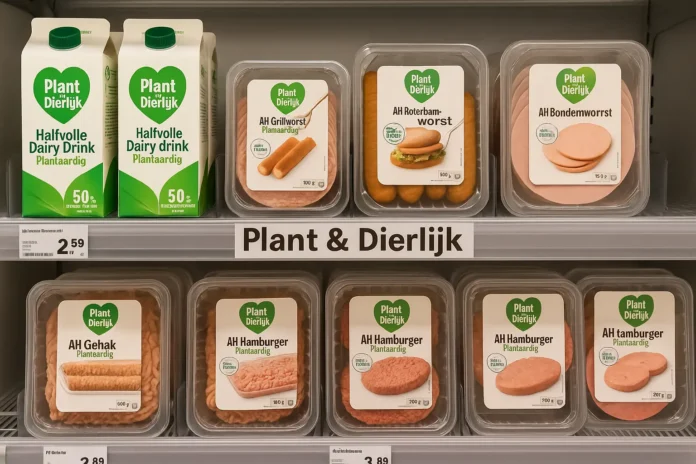Albert Heijn today launched 15 new hybrid products blending animal and plant-based ingredients, aiming to deliver the taste of traditional foods with lower saturated fat, less CO₂ emissions, and competitive pricing.
The hybrid range spans semi-skimmed dairy drinks, minced beef, bratwursts, cervelat, salami and more—infused with plant proteins like field beans, sugar beet fibre, celeriac, and butter beans.
“The idea of combination products is new, but our tests show they’re just as tasty,” says Nienke Tjerkstra, Head of Sustainability & Health at Albert Heijn.
“We want customers to increase plant-based eating—without sacrificing taste, habit or price. Small steps add up.”
Why It Matters: The Protein Transition
Europe is in the midst of a protein transition: shifting diets toward sustainable proteins to reduce climate impact. Albert Heijn is responding with hybrid offerings that fit in regular shopping baskets, avoiding the reluctance surrounding fully vegan products.
Parent company Ahold Delhaize aims for 60% of protein sales to be plant-based by 2030—up from 44.2% at the end of 2024 (with this launch acting as a practical accelerator)
What’s on the Shelf—and How It Performs
Priced equal to or less than standard versions, the hybrid line includes:
2 semi-skimmed dairy drinks blended with plant proteins
7 meat hybrids (lean minced beef, burgers, bratwursts, soup balls, chipolatas) boosted with sugar beet fibre
6 cold cuts & sausages, including grill sausage, boiled sausage, sandwich cuts, and salami/cervelat infused with celeriac and butter beans
By offering this variety, AH ensures consumers can swap in familiar meals—like spaghetti Bolognese or sammies—without thinking twice.
Competitive Landscape: Where AH Stands
Aldi Nord and Lidl in the Netherlands recently launched 60% meat–40% plant protein burgers, priced around €2.50 per 300 g—aiming to cut emissions and stay wallet-friendly
Unlike previous retailer attempts that stalled (e.g., Aldi UK’s 2019 “Flexitarian Burger” or Tesco’s 2021 “Lean & Greens” range), AH is pairing scale, variety, and serious R&D to avoid past pitfalls
Meanwhile, UK retailer Tesco is struggling to meet its 300% growth target for plant-based meat, with consumers increasingly favoring whole-food, minimally processed plant proteins instead
What Research Says: Taste and Acceptance
One study from Wageningen University shows hybrids (with 25–50% plant protein) are well-received by meat-eaters—with taste, texture, and convenient preparation being key drivers.
Consumers find hybrids:
Nearly as tasty as pure meat (and often healthier)
Easier to adopt than fully plant-based options
Viewed as healthier and more sustainable than meat.
Expert Insight
“Hybrid products are a clever bridge,” says Dr Arjen van Wingerden, food-systems analyst at Wageningen University.
“They tackle both taste and price concerns while nudging shoppers toward climate goals.”
Albert Heijn’s format—spanning dairy drinks, cold cuts and sausages—signals a comprehensive strategy rather than a pilot.
Health, Environment, and Footprint
Swapping a portion of meat or dairy for plant ingredients significantly reduces CO₂ and saturated fat per serving. Cutting half of typical meat can reduce agricultural emissions by ~31% and land use by ~12%
For euro-savvy shoppers amid rising food prices, AH’s new range offers both cost effectiveness and health benefits.
Strategy and Industry Implications
Albert Heijn’s hybrid range sets it apart in a competitive Dutch grocery market. While Jumbo and PLUS have expanded 100% plant lines, AH is bridging between traditional and vegan—using taste-tested innovation, price, and scale.
This move places AH alongside European retailers like Lidl and Aldi, but with broader depth and higher customer engagement.
If successful, it could trigger a cascade across competitors: we may soon see hybrid offerings from Jumbo, Lidl, or discount chains.
Final Take
Albert Heijn’s hybrid launch is not a gimmick, but a strategic pivot in protein retail. It responds to trends in taste preference, environmental urgency, and economic pressure. By offering familiar foods with a twist of sustainability, AH could rewrite the playbook—and provoke a swifter shift in European grocery norms.



